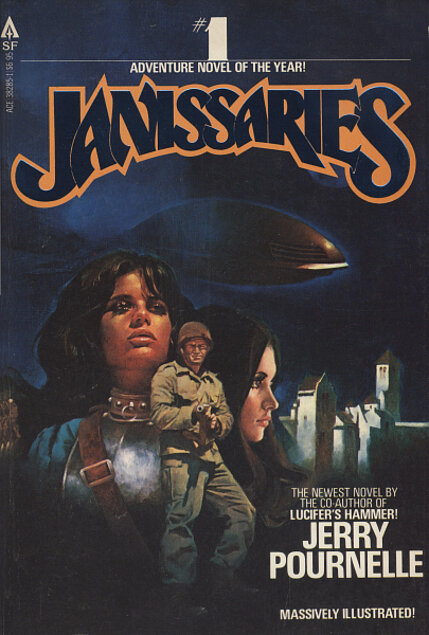Janissaries Book Review

by Jerry Pournelle
335 pages;$5.95
This is the first book of a trilogy. Jerry Pournelle is working on a fourth, but it has not yet been finished. This is a fun book. The concept does border on the ridiculous, but the payoff comes in the form of useful tidbits of history and science. This edition is massively illustrated [it actually says that on the cover!] by Spanish artist Bermejo.
Captain Rick Galloway finds himself in a hopeless battle. His mercenary unit is bankrolled by the CIA to fight a proxy war in Africa, but plausible deniability means that the air cavalry will not be coming to the rescue. Before his position is overrun, a mysterious silent craft lands and the occupants offer him and his men santcuary. Unsurprisingly, this strange offer is preferred over death.
Galloway's benefactors do not really have his best interest in mind. Rather, they want some dirty work done on a primitive planet that just happens to grow the best narcotics in the universe. Very little of this is shared with Galloway, need to know and all that. Part of the reason for this is the aliens have been doing the same thing every six hundred years for four millenia.
This implausible setup gives us a most interesting setting: Tran is a planet that combines the most interesting aspects of Greek, Roman, and subsequent European culture and technology. Galloway and his men are useful because technology has stagnated at the tenth century. Heavy cavalry is not much use against an H&K G3. The aliens do explain that they want Galloway to control enough land to be able to grow enough "product" to make this expedition worth their while. All of this is complicated by political intrigues both local and intergalactic that need not detain us here.
This book plays on the post-modern need for adventure. A Victorian adventure novel like King Solomon's Mines was not entirely implausible for the day. Allan Quatermain is largely based on a real man, Frederick Selous, who was a contemporary of Cecil Rhodes and Teddy Roosevelt. If you really wanted adventure, there was plenty for the taking in the Victorian era. Now, the world is lame. Everything is permits and impacts and carbon credits. There is simply no room for adventure anymore.
Tran is different. A man could be a king, if only he wanted it badly enough. The world is empty enough to allow for greater things. Since this is a science fiction novel. Galloway sets out to see how much twentieth century technology he can impart to the natives. Pournelle does this far better than Twain, who was more interested in scoring points than in thinking about the most effective way to preserve knowledge in difficult times. King David's Spaceship and Lucifer's Hammer are other works by Pournelle that explore this theme. Survivalism is currently enjoying a resurgence in popularity, but a major difference between Pournelle's work and the popular thrust is Pournelle's grasp of the value of community. Many survivalists have an extreme libertarian streak that undercuts their stated goal: loners don't survive long in difficult times.
Captain Galloway is another strong leader by Pournelle. He does not have the same charisma on the page that Colonel Falkenberg does. This is partly a stylistic choice. We rarely see Falkenberg's inner monologue; he remains aloof and imperturbable. Galloway is far more human. We see him make mistakes and have regrets and experience moments of weakness. For all that he still does well. Galloway is genuinely likeable, and tries to do what is right. He muddles through as best he can. So do we all.
Comments ()